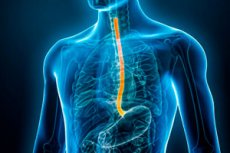New publications
Uncovering the link between the microbiome and esophageal cancer
Last reviewed: 02.07.2025

All iLive content is medically reviewed or fact checked to ensure as much factual accuracy as possible.
We have strict sourcing guidelines and only link to reputable media sites, academic research institutions and, whenever possible, medically peer reviewed studies. Note that the numbers in parentheses ([1], [2], etc.) are clickable links to these studies.
If you feel that any of our content is inaccurate, out-of-date, or otherwise questionable, please select it and press Ctrl + Enter.

Esophageal cancer (EC) is an aggressive malignancy with a poor prognosis, the development and progression of which can potentially be influenced by changes in the esophageal microbiome. Recent studies have shown that certain microbiome compositions may be associated with EC development, treatment response, and patient prognosis.
Esophageal cancer has two main subtypes: esophageal squamous cell carcinoma (ESCC) and esophageal adenocarcinoma (EA). These subtypes differ significantly in geographic distribution, risk factors, and clinical characteristics. Despite significant efforts, ESCC remains difficult to diagnose and treat due to frequent late detection and resistance to conservative treatment.
A comprehensive review by researchers at Zhengzhou University, Henan Cancer Hospital, and Marshall Medical Research Center represents a significant advance in oncology. Published in Cancer Biology and Medicine, the review highlights significant findings regarding changes in the esophageal microbiome in RC and their impact on the pathogenesis and prognosis of the disease.
It identifies key shifts in the microbiome associated with RP and explores how these changes may impact patient outcomes.
The researchers found that specific changes in bacteria were associated with different stages of RP. For example, lactic acid-producing bacteria were more common in AP, suggesting that these microbes may support tumor survival by converting glucose into lactic acid, providing energy to cancer cells.
They also noted a decrease in microbial diversity in PPC compared to non-tumor tissues. This decrease in diversity was associated with increased levels of Fusobacterium and decreased levels of Streptococcus, suggesting that certain microbial profiles may play a role in cancer progression.
The study also examined how microbiome dysbiosis may influence treatment outcomes. Different microbial compositions were associated with different responses to radiotherapy and chemotherapy, highlighting the potential for the esophagus to influence treatment efficacy.
"Understanding the role of the esophageal microbiome in the development and progression of RP may lead to earlier detection and personalized treatment approaches," said Hongle Li, PhD, one of the study's authors. "Our findings suggest that microbiome dysbiosis may not only contribute to the pathogenesis of RP but also influence treatment outcomes."
The study has important implications for early detection and improved treatment strategies for RP. Identification of microbial markers associated with disease progression may pave the way for targeted therapies that disrupt cancer-causing bacteria. Moreover, specific microbial profiles may serve as prognostic indicators, aiding treatment planning and patient monitoring.
